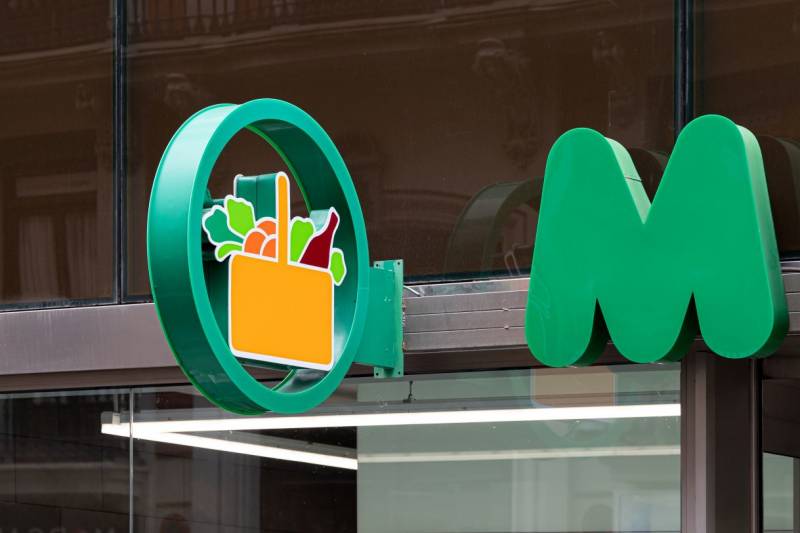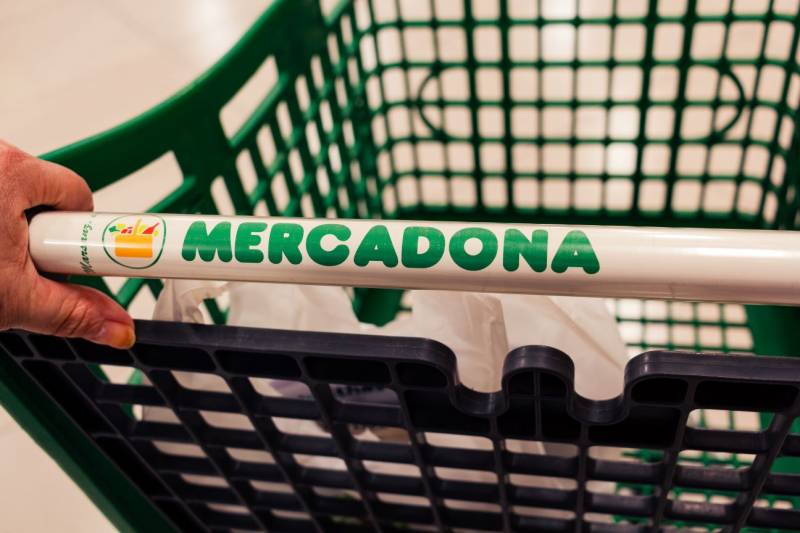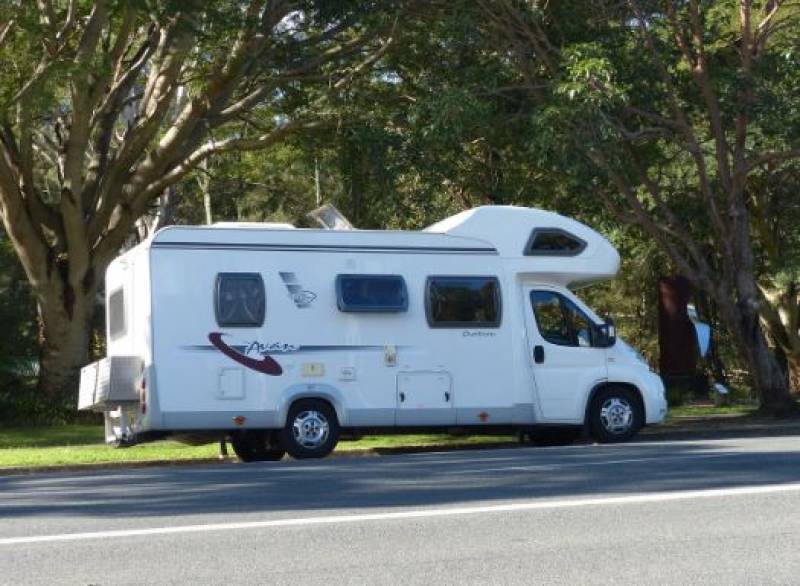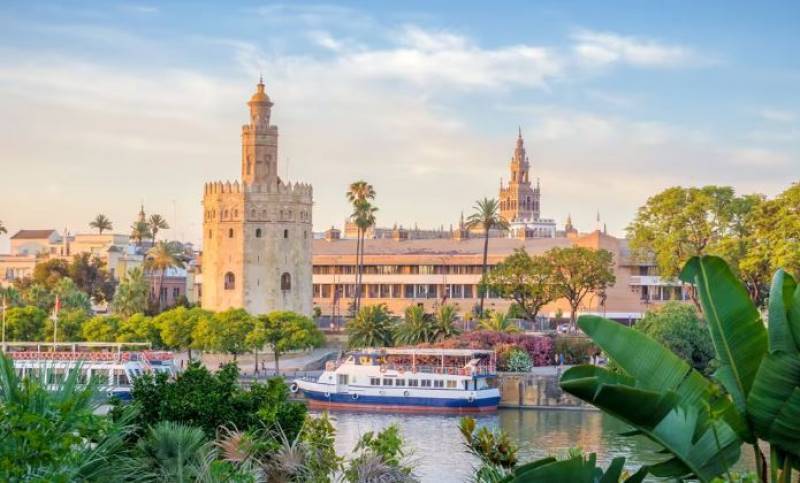
To be listed on the haciendadelalamo TODAY MAP please call +34 968 018 268.
article_detail
Spanish News Today Editors Roundup Weekly Bulletin Sept 27

TOP STORIES: "Mercadona announces surprise opening hours for Spain Day" & "Here's the weather we can expect this autumn in Spain"
We’re coming up to October soon and while Spanish schools don’t have a half term because they start later than UK schools, they do have festivos dotted throughout the term. There’s one coming up in October, on which we have a surprising new development to report this week, plus the general forecast for the type of weather we are due to receive between now and the end of the year.
So settle down and get ready to read on with a nice glass of something… but will it be red, white or rosé?
Wine not

For centuries, red wine has been synonymous with Spanish culture. Think bold Riojas and fruity Tempranillos filling glasses at every dinner table. But guess what? White and rosé wines are now stealing the spotlight. Yep, more people are reaching for chilled whites and crisp rosés, leaving the reds to gather a bit of dust.
According to Rafael del Rey from the Spanish Wine Market Observatory, this isn’t just a passing trend. White and rosé wines are now more popular, especially with younger drinkers and women, thanks to their lighter, fresher appeal.
The numbers back it up, too. The average price of white wine has shot past red, which was unheard of until recently. With vineyard owners shifting production to meet this new demand, more than half of the wine produced in Spain last year was white.
Even though red wine still holds the majority in household consumption, it’s clear that change is in the air (and the glass). And while this shift is keeping local producers busy, some regions are struggling with unsold stock. To help manage this, Brussels has introduced measures like ‘crisis distillation’, turning excess wine into alcohol for industrial use – anything to avoid an oversupply.
Quite why this is necessary when red wine gets better with age is a bit of a mystery to me, but if they’re really intent on getting rid of their leftover plonk I have an address right here they can donate it to…
That ‘autumn’ be good…
Forgive me, my wordplay is getting worse and worse each week. I’m pretty sure this one doesn’t even make sense.
Still, the point is that the State Meteorological Agency (Aemet) has released its weather prediction for the overall kind of autumn we can expect this year and it should be surprisingly toasty.

The boffins have proclaimed that, especially in the southern and eastern parts of Spain like Murcia and Alicante, there will be higher-than-usual temperatures this October, November and December, but that doesn’t necessarily mean it’ll be summer heatwave weather at Christmas. Just a bit warmer than the average as calculated by the mean over previous years.
The western side of Spain and the Canary Islands, meanwhile, will probably be drier than usual over this period, but Aemet have admitted that they actually don’t really know what will happen with regards to the rainfall situation elsewhere. Which is nice of the weather forecasters to admit they really can’t predict the weather with any great degree of certainty.
This warm forecast follows a scorcher of a summer, which was officially Spain’s sixth warmest on record. In fact, July and August were the second hottest ever recorded, just behind 2022. This was thanks to back-to-back heatwaves, one of which was registered as having dragged on for a whopping 21 days and spanning 31 out of the 52 provinces.
And yet, if you can believe it, it was also one of the wettest summers in recent years. Spain had 117% of its usual rainfall, thanks to some heavy downpours in June and August, though it was a bit of a mixed bag, with some areas getting soaked and others staying dry as a bone.
So, as we move into autumn, the trend from summer basically continues, albeit with lower temperatures – warmer days, possibly some scattered showers (if we’re lucky), and the usual unpredictability.
You might want to keep that sun cream and umbrella handy because in Spain these days, you never know what the weather’s going to throw at you next!
Mercadon’tya start

Spain is getting ready to celebrate one of its biggest holidays, Spain Day – or as locals call it, El Día de la Hispanidad. Every year on October 12, the country marks this day with pride.
Schools close, businesses take a break, and the entire nation gets into celebration mode. But this year, things are a little different. Spain Day lands on a Saturday, which might be disappointing for anyone hoping for an extra weekday off, although some areas will be transferring it to the Friday before, October 11.
One thing that’s new this year in the run-up to the Spain Day celebrations concerns Mercadona, Spain’s most popular supermarket chain, which is doing something out of the ordinary.
Known for sticking to the rules and shutting down on holidays, Mercadona surprised everyone by announcing it will remain open on Spain Day this year. Well, mostly. Most of its stores across the country will operate, except for those in Aragón and the Basque Country, where staff still get their day off as usual.
Customers are split over the change in policy; on the one hand, it’s nice to be able to go into Mercadona on a Saturday as usual and do the weekly shop, but others are affronted that the beloved store should stoop to the level of other lesser shops and force staff to work on a bank holiday.
So, if you’re planning a barbecue or maybe a beach day, you’re in luck but if you happen to work at Mercadona, not so much. Even so, hours will be reduced, with most locations opening from 9am to 3pm. Mercadona also recommends that customers use their store locator online to check each store’s specific opening and closing times so you don’t end up at a closed store.
And since we’re talking about festivos, after Spain Day, there’s a bit of a lull before the next round of public holidays hits. November 1 is All Saints’ Day, followed by Spanish Constitution Day on December 6 and of course, Christmas Day on December 25.
Murcia
In Murcia, the statistics from the number of hotel stays this summer have been revealed, and the Region is really on a roll. Hotels and tourist accommodations smashed records this summer, with a whopping 439,819 overnight stays in August alone – that’s a 3.5% increase from last year.
Most of the tourists who came to stay were Spaniards (around 71%) and the rest were foreigners (about 29%), with foreign visitors up by 15.3% on the year before. Hotels were buzzing with a solid 63.86% occupancy rate and a not-too-shabby average daily room rate of 94.15 euros.
All this success meant the hotel sector hired 6.6% more staff to keep things running smoothly. In short, a positive trajectory for the Region’s tourist industry, which is an important part of the local economy.
On a not-so-positive note, Murcia is still coming to terms with the tragic events of last year’s nightclub fire, and as we approach the one-year anniversary of the incident which claimed the lives of 13 people, there are still questions to be answered.
Just this week, demolition began on the building that housed the Teatre and Fonda Milagros nightclubs, where the devastating fire occurred. The demolition, which has been delayed for months due to legal and technical complications, is now finally moving ahead – a bittersweet step towards closure for the victims’ families.

The judicial investigation, however, is far from over. In fact, it’s just been extended by another six months because key reports on fire safety and prevention are still missing. Lawyers are pointing fingers at everyone from the nightclub owners to the local council, and with six people currently under investigation, it’s clear that the families are determined to seek justice.
Onto the resorts now, and the municipality of Alhama de Murcia, which includes the Condado de Alhama Golf Resort, is stepping up for its feline friends. The town has hired a specialised vet to monitor and manage its feral cat colonies.
This new recruitment is part of a larger effort to improve the lives of the local strays, which also included a recent (and really quite popular) workshop for aspiring cat colony caretakers.
The council has a plan in place to manage the cats, including the Capture, Sterilise and Release programme to try to keep the local cat population healthy and under control while making sure humans and felines can coexist peacefully. There’s even an adoption fair in the works soon, so keep an eye out for that!
These plans exist in many towns across Spain and involve the use of qualified, certified cat feeders to look after the cat populations and make sure they don’t get out of control, or diseased, or spread to areas they shouldn’t. If you’ve ever seen a bunch of cats all hanging around in one area near where you live, do not go and feed them or try to look after them yourself – all of this is taken care of by a team nominated by the local town hall.
But possibly the most extraordinary story from around Murcia and its resorts this week comes from Hacienda del Álamo, where plans are in motion to build more than 1,100 new homes thanks to a hefty investment from the Hozono Global Group.

The new development promises eco-friendly properties that are integrated into the natural environment, complete with green spaces and a commitment to sustainable development.
With prices starting at just 174,900 euros, this isn’t just another run-of-the-mill urbanisation – it’s part of a broader effort to revitalise the area after the financial crisis left it unfinished and in debt. Now, with new owners at the helm and big plans for the future, the Hacienda del Álamo resort is gearing up for a serious glow-up.
This puts HDA in the same boat as Condado, Corvera Golf Resort and Las Terrazas de la Torre, among others, who have all been receiving huge cash injections from investors recently. Watch this space because all of these complexes will be trying to grow to the size and weight of Camposol, La Torre or Mar Menor Golf Resort over the next few years.
Let’s see, what’s going on this weekend? Well, we’ve got the Fiestas de La Manga del Mar Menor, there’s the Visor Fest music festival in Murcia city featuring Kula Shaker and The Charlatans, and it’s also the last hurrah for the Fiestas de Cartagineses y Romanos in Cartagena, plus plenty more, as always.
Remember to see our EVENTS DIARY for more events and activities coming up soon in the Region of Murcia:
Spain
 The Spanish government announced this week it would be tightening the rules around cosmetic surgery. From now on, only specialist doctors will be allowed to perform these procedures. This comes after a tragic incident in Murcia, where a woman named Sara Gómez lost her life following a botched liposuction operation.
The Spanish government announced this week it would be tightening the rules around cosmetic surgery. From now on, only specialist doctors will be allowed to perform these procedures. This comes after a tragic incident in Murcia, where a woman named Sara Gómez lost her life following a botched liposuction operation.Her family’s fight for better regulations has finally paid off, with the Ministry of Health stepping in to ensure that only certified professionals handle cosmetic surgeries moving forward. This decision marks a huge win for patient safety, as the number of cosmetic procedures in Spain has skyrocketed over the years.
It’s a stark contrast to other European countries where regulations are laxer.
“This measure is, without a doubt, a huge victory for the family of Sara, a woman who unfortunately lost her life after undergoing an operation in a beauty centre that did not have the necessary guarantees,” Spain’s Minister of Health, Mónica García, said.
“Her family’s struggle has been key to achieving this important change. We are taking an important step towards a safer health system, so that tragedies like Sara's do not happen again,” she added.
In more regulatory news, the Spanish government has postponed new rules for registering guests in hotels and private rentals. You might remember from last week that the plan was to introduce this controversial requirement on October 1.
Essentially, the law requires landlords and hotels to collect and share sensitive information about their guests with the Ministry of the Interior. This includes payment methods, financial transactions, check-in and check-out dates, contract details and personal contact information.
But after facing heavy backlash from the tourism sector, the government decided to push the deadline back to December 2. Hotel owners argued that these new requirements would lead to mistakes and potential privacy violations, and even some European tourism groups expressed their concern over the lack of clarity.
The government is now planning further discussions with tourism representatives to smooth things out. This delay is a big relief for the industry, which was scrambling to get ready for the new rules. There’s still some uncertainty about how everything will play out, but at least there’s more time to figure it out.
As if all of this wasn’t enough, Spain has also been struck by a heartbreaking accident. An 84-year-old German tourist tragically lost her life on a motorway in Valencia after falling out of a moving campervan.
 The victim’s daughter-in-law was driving when the right-hand side door suddenly opened, sending the elderly woman tumbling onto the busy A7. A truck driver witnessed the accident and called emergency services, but it was too late. Tragically, another car hit the woman before anyone could react.
The victim’s daughter-in-law was driving when the right-hand side door suddenly opened, sending the elderly woman tumbling onto the busy A7. A truck driver witnessed the accident and called emergency services, but it was too late. Tragically, another car hit the woman before anyone could react.The daughter-in-law didn’t realise what had happened until she stopped at a petrol station nearly 9 kilometres away and couldn’t find the elderly woman, who had been travelling in the back of the motorhome.
Authorities believe the victim may have mistaken the campervan’s exit door for the bathroom door in the dark.
While the driver has not been charged, police did remind the public that passengers should never move around inside a vehicle while it’s in motion.
Alicante
It’s been an eventful few days along Spain’s Costa Blanca, with a mix of shocking events that have stirred both local communities and social media.
Let’s start with the tragic end of a blue shark’s journey along the beaches of Dénia. Just a day after causing a stir on the shores of Les Deveses beach, the shark’s lifeless body washed up on the nearby Els Molins beach.
 Spotted swimming in a disoriented state near the Lamar Restaurant, the shark seemed weak, even ignoring a dog barking and racing towards it in the water. Lifeguards made a brave attempt to guide the animal back out to sea, but sadly it was too far gone.
Spotted swimming in a disoriented state near the Lamar Restaurant, the shark seemed weak, even ignoring a dog barking and racing towards it in the water. Lifeguards made a brave attempt to guide the animal back out to sea, but sadly it was too far gone.While blue sharks are pretty common in the Mediterranean and generally pose no threat to humans, their appearance so close to shore is unusual, usually signalling that the animal is unwell.
This particular shark, with its distinctive pointed snout and typically reaching about two metres in length, had clearly been struggling. A post-mortem will be conducted to determine the cause of its demise.
Unfortunately, this isn’t the first time a blue shark has washed up along the Alicante coast this year – another was discovered off the coast of Altea in May, its fate just as tragic.
As the beaches deal with the aftermath of the shark’s appearance, another drama unfolded on the roads of Orihuela Costa when a car was left teetering dangerously over a bridge that links the Lomas de Cabo Roig area with the coast.

Locals have long raised concerns about the safety of this busy stretch, and Monday’s accident only confirmed their fears. The car had careened across the road and lodged itself in the low guardrail, just inches away from tumbling onto the AP-7 motorway below. Firefighters were called in and worked for hours to secure the vehicle and prevent what could have been a far worse disaster.
The accident brought renewed attention to calls for a pedestrian overpass in the area, a demand that residents have been making for years. The current bridge, the only road connecting this bustling residential area to essential services along the coast, has been flagged as dangerous for quite some time.
Fortunately, the local government has included a pedestrian bridge in their latest budget, with 1.3 million euros allocated for its construction. However, locals have been disappointed before – back in 2022, a similar promise fell through when the company contracted for the job breached its agreement.
Now, residents are left hoping that this time, action will follow the words.
Finally, in a scene straight out of a crime thriller, authorities at Alicante-Elche Airport recently dealt with a dangerous fugitive in full Hannibal Lecter-style restraints.

The 36-year-old Kazakh national, Eduard M., was arrested back in March in Rojales and has been awaiting extradition to Germany for a string of violent crimes. Onlookers were stunned to see the prisoner shackled and masked as he was escorted onto a plane bound for Germany, where he faces more than nine years in prison for offenses ranging from kidnapping to armed robbery.
Eduard’s capture came after months of evading authorities by altering his appearance and hiding out in Torrevieja. His dramatic arrest took place in a café in Ciudad Quesada, putting an end to his life on the run.
His crimes, committed in Hamm, Germany in 2021, read like something from a movie. Along with three masked accomplices, Eduard broke into a home, tied up the residents, and threatened them with violence to steal a significant amount of cash, gold coins, silver bars and other luxury items.
The victims were locked in a closet as the criminals fled, but their terrifying ordeal ended when they were eventually freed.
Andalucía
As always, the Costa del Sol has been grabbing headlines for some pretty wild reasons lately!
First up, we have a sad but also surreal story from Nerja, where an Irish tourist is fighting for her life after her dress caught fire at a wedding celebration. In a nightmarish turn of events, the woman’s dress brushed against some decorative candles in the bathroom, and before anyone knew it, she was engulfed in flames.
Wedding guests quickly stepped in to call for help, but the woman had already suffered severe burns and was rushed to a hospital in Málaga. Later, she was transferred to a specialist burns unit over in Seville, where doctors had to work around the clock to try to keep her alive.
It’s a heart-wrenching story, and as of now, her recovery is still uncertain. The police don’t seem to be involved, so it’s being treated as a horrific accident.
Now, from fire to fur… imagine settling down for a nice flight to sunny Málaga, only to have your lunch commandeered by an unexpected stowaway: a mouse! Yep, this really happened on a Scandinavian Airlines flight from Oslo.
One unlucky passenger opened their food, and out popped a mouse, no doubt looking for its own in-flight meal deal. Naturally, chaos ensued, and the plane made an emergency stop in Copenhagen so that the crew could figure out what to do.
Rodents and planes don’t exactly mix – apparently, they have a nasty habit of chewing through wires, which is the last thing you want 30,000 feet in the air. Luckily, everyone was swiftly transferred to a new plane, and the airline has promised a full investigation into how this little guy managed to sneak on board. Someone’s definitely having a stern word with the catering company!
To finish off, we’ll hop back to the city of Seville, which has just been crowned Lonely Planet’s top European destination to visit this autumn – and with good reason. After months of quite excruciating heat, Sevilla’s now in that sweet spot, with lovely mild temperatures perfect for exploring its historical gems.
From the majestic Plaza de España (too hot in summer as there is very little shade but an absolute delight of a square to behold) to the Torre del Oro and the mesmerising Cathedral, the city’s bursting with culture, charm and – like anywhere in Spain – incredible food.
Seville wasn’t the only Spanish destination to make Lonely Planet’s top 10, as Tenerife in the Canary Islands came in at number eight.
But the fact that the world’s leading travel guide would place an Andalusian city in the top spot is testament not only to Seville itself, but also to how much the autonomous community of Andalucía and Spain as a whole have to offer to visitors and people who live here, whatever the season.
It’s so much more than beaches and beers. So much more than pool holidays and party hooliganism in Mallorca and Magaluf. We really are so lucky to be able to explore Spain in more depth and enjoy the cultural delights it provides for those who are willing to seek them out. But I don’t have to tell you that.
Oh, and just keep an eye out for any rogue mice along the way!

You may have missed…
- Spanish supermarkets reduce package size while increasing prices.
Shrinkflation strikes again as retailers continue to reduce the overall size of products while keeping prices the same, or even increasing them in some cases. - The fight against overtourism—Costa Blanca towns are refusing tourist licences on holiday apartments.
In a bold move to reclaim their communities, towns along Alicante’s Costa Blanca coastline are taking a stand against the unbridled growth of tourist apartments. - Hacienda Riquelme Golf Charity Day raises 20,000 euros for worthy causes.
This year’s Hacienda Riquelme Golf Charity Day was another resounding success, having raised an incredible €20,000 to be donated to local organisations MABS, Cancer Relief, Sucina school, Sucina Nuns and Sucina Caritas. - The surprising ways you can fail a breathalyser test without drinking.
As the debate over the alcohol limit in Spain continues to rage, with the Ministry of the Interior pushing for a reduction to 0.2 grams per litre of blood, what many drivers don’t know is that it’s not just beer, wine and spirits that can push them over the limit, but alos certain foodstuffs… - Thieves toss luxury BMW into Orihuela Costa canal.
Pedestrians strolling along the Tajo-Segura transfer canal between Orihuela Costa and Pilar de la Horadada got quite the surprise on Thursday September 27 when a BMW was spotted submerged in the canal.
That’s all for this week. Thanks for reading and we’ll be back next week.
See ya!
Contact Murcia Today: Editorial 000 000 000 /
Office 000 000 000























